八年级下Module 3 On the radio Unit 3 Language in use
文档属性
| 名称 | 八年级下Module 3 On the radio Unit 3 Language in use |
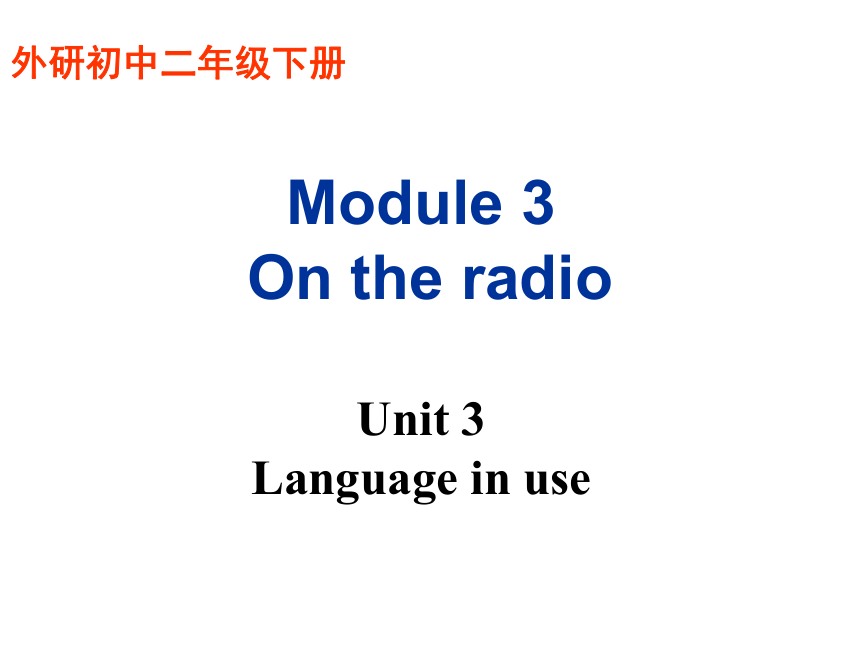
|
|
| 格式 | rar | ||
| 文件大小 | 1.5MB | ||
| 资源类型 | 教案 | ||
| 版本资源 | 外研版 | ||
| 科目 | 英语 | ||
| 更新时间 | 2012-03-01 00:00:00 | ||
图片预览

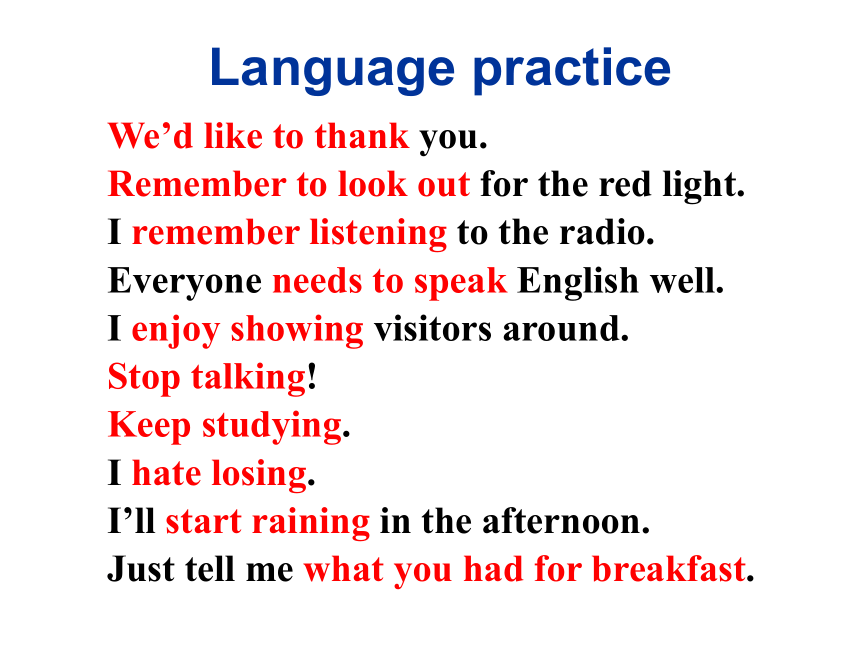
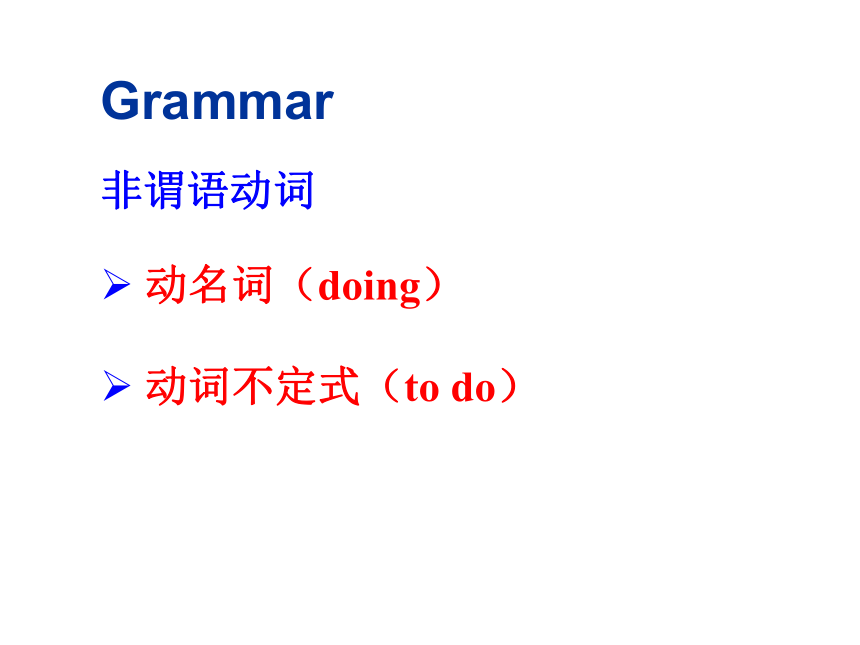
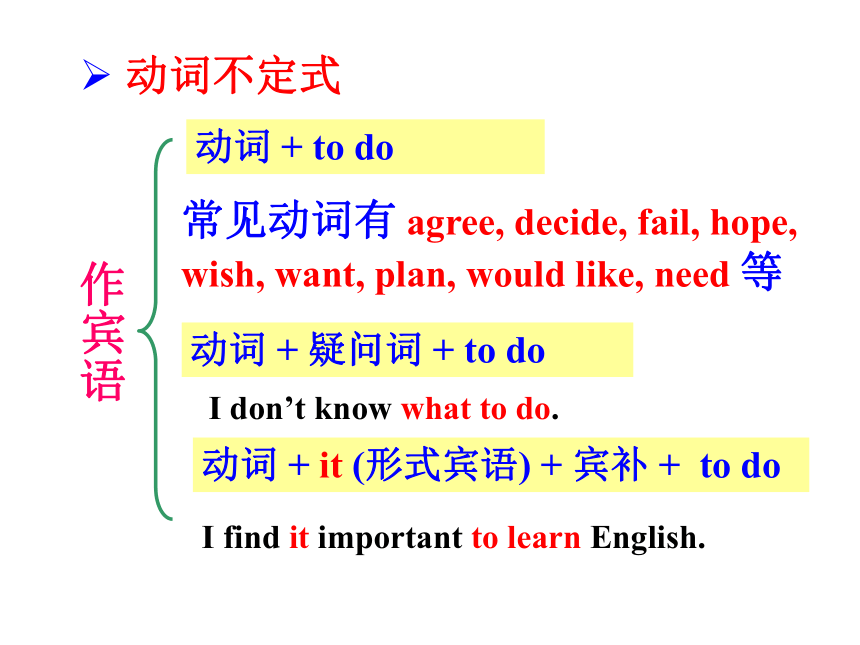
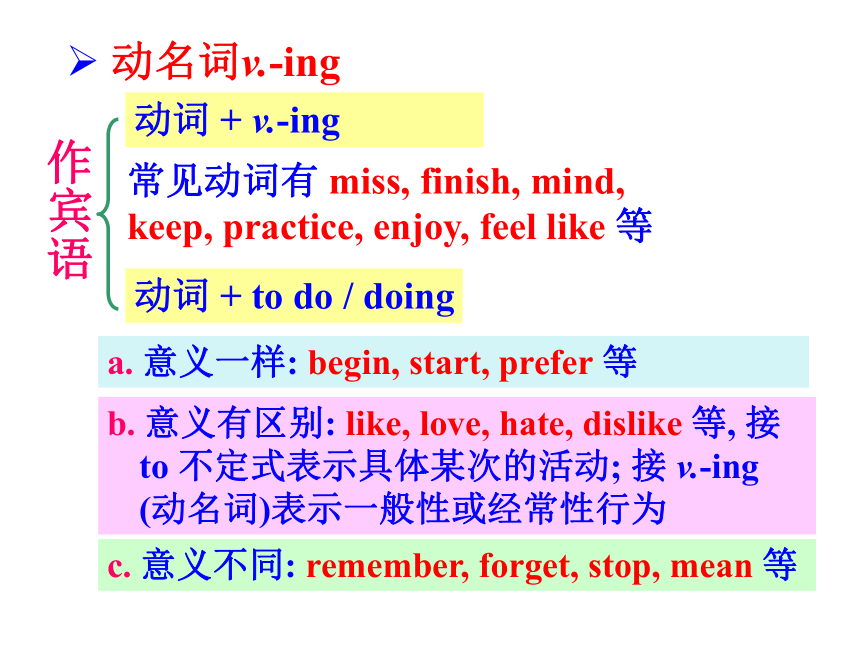
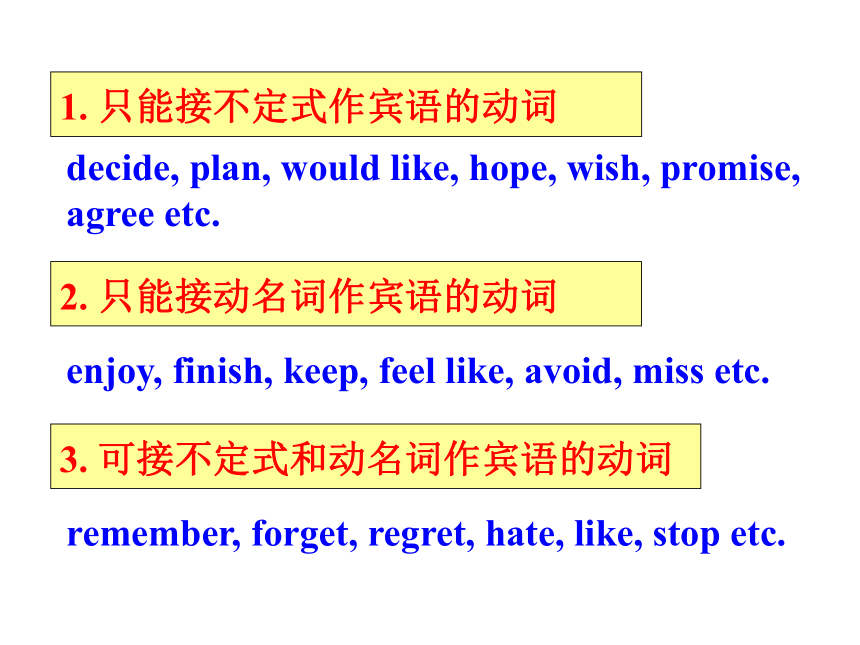
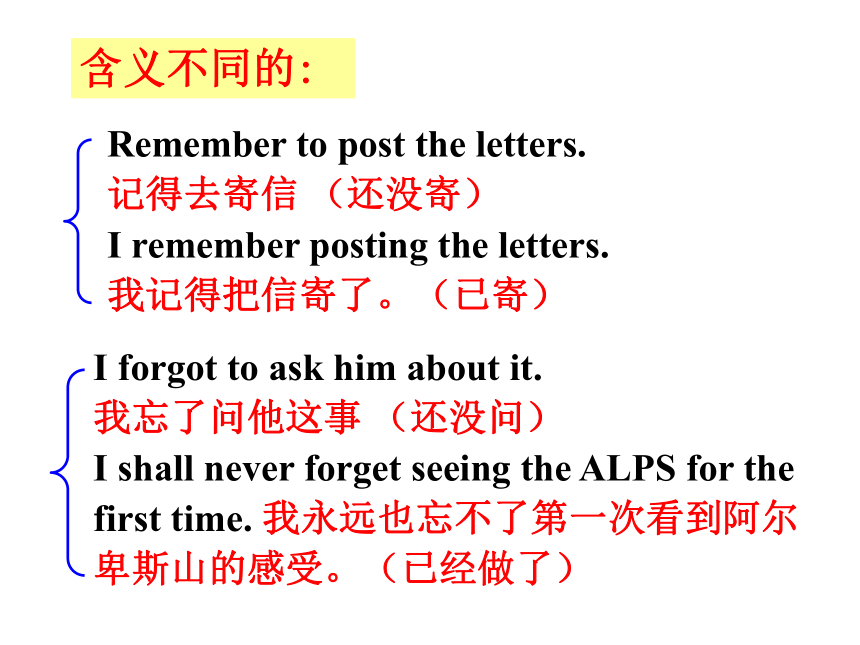


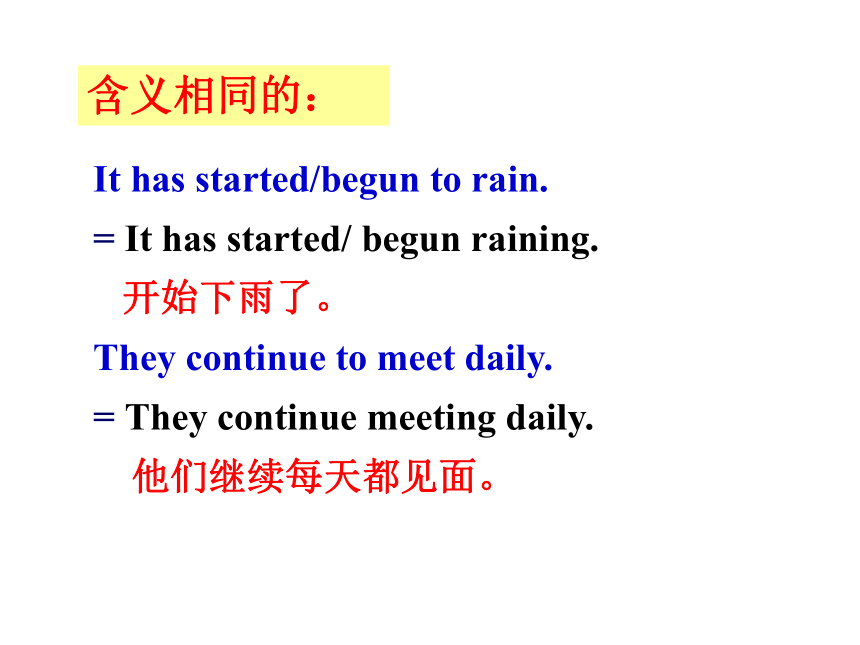
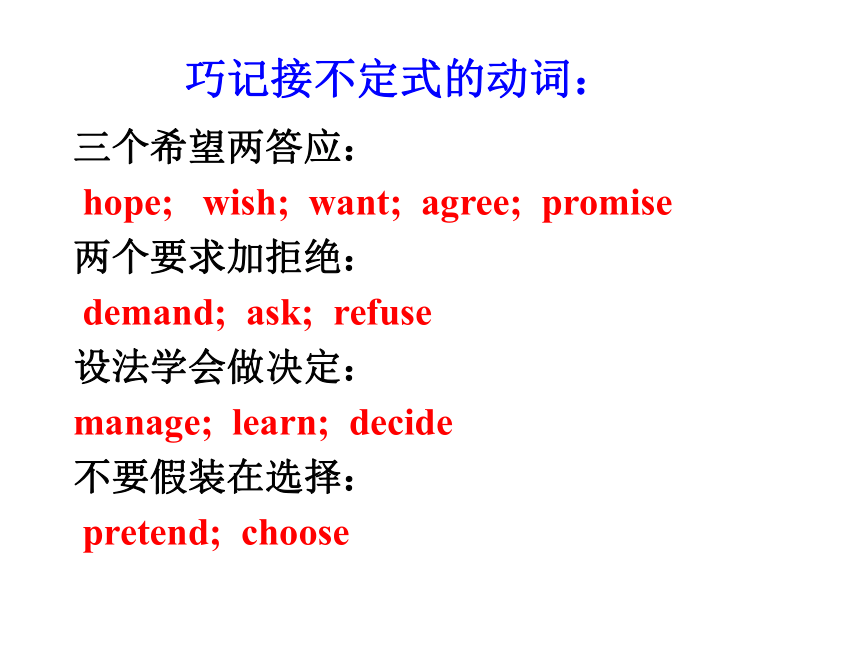
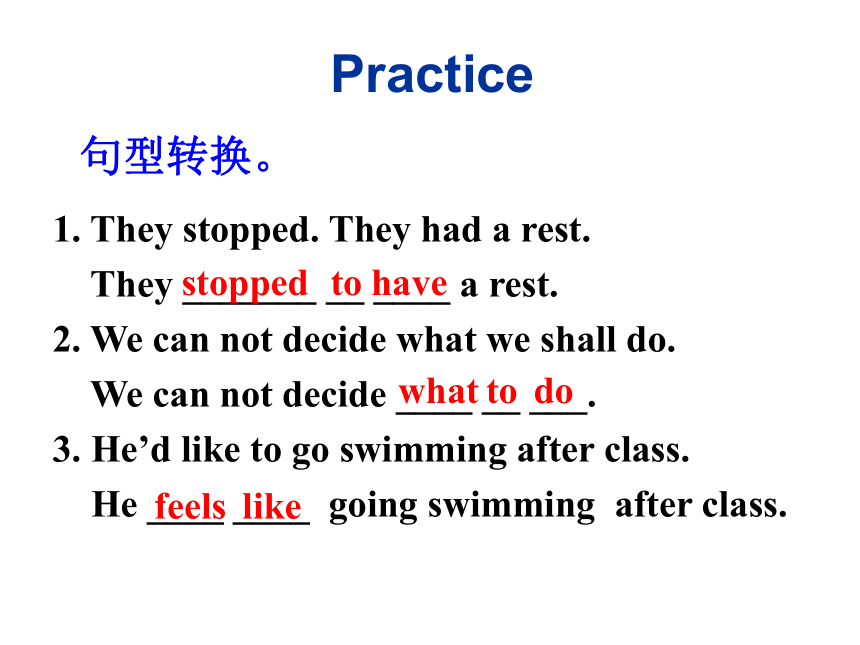
文档简介
课件35张PPT。外研初中二年级下册Module 3
On the radio
Unit 3
Language in use We’d like to thank you.
Remember to look out for the red light.
I remember listening to the radio.
Everyone needs to speak English well.
I enjoy showing visitors around.
Stop talking!
Keep studying.
I hate losing.
I’ll start raining in the afternoon.
Just tell me what you had for breakfast. Language practice非谓语动词 动名词(doing) 动词不定式(to do)Grammar 作宾语动词 + to do动词 + 疑问词 + to do 动词 + it (形式宾语) + 宾补 + to do常见动词有 agree, decide, fail, hope, wish, want, plan, would like, need 等I don’t know what to do.I find it important to learn English. 动词不定式作宾语动词 + v.-ing常见动词有 miss, finish, mind, keep, practice, enjoy, feel like 等动词 + to do / doinga. 意义一样: begin, start, prefer 等c. 意义不同: remember, forget, stop, mean 等b. 意义有区别: like, love, hate, dislike 等, 接to 不定式表示具体某次的活动; 接 v.-ing (动名词)表示一般性或经常性行为 动名词v.-ingdecide, plan, would like, hope, wish, promise, agree etc.enjoy, finish, keep, feel like, avoid, miss etc. remember, forget, regret, hate, like, stop etc.1. 只能接不定式作宾语的动词2. 只能接动名词作宾语的动词3. 可接不定式和动名词作宾语的动词 含义不同的: Remember to post the letters.
记得去寄信 (还没寄)
I remember posting the letters.
我记得把信寄了。(已寄)I forgot to ask him about it.
我忘了问他这事 (还没问)
I shall never forget seeing the ALPS for the first time. 我永远也忘不了第一次看到阿尔卑斯山的感受。(已经做了)Stop talking please!
请不要讲话。(停止正在做的事情)
He stops to read the novel.
他停下来看小说去了。(停止正在做的
事情去做另一件事情)含义有区别的:I like to have bread for breakfast.
我喜欢早餐吃面包。(可能只是吃一次面包)
I like having bread for breakfast.
我喜欢早餐吃面包。(经常性的吃面包当早餐)含义相同的:It has started/begun to rain.
= It has started/ begun raining.
开始下雨了。
They continue to meet daily.
= They continue meeting daily.
他们继续每天都见面。巧记接不定式的动词:三个希望两答应:
hope; wish; want; agree; promise
两个要求加拒绝:
demand; ask; refuse
设法学会做决定:
manage; learn; decide
不要假装在选择:
pretend; choose1. They stopped. They had a rest.
They _______ __ ____ a rest.
2. We can not decide what we shall do.
We can not decide ____ __ ___.
3. He’d like to go swimming after class.
He ____ ____ going swimming after class.stoppedtohavewhattodofeelslike句型转换。Practice 4. I find it’s interesting to learn English.
I find __ __________ __ learn English.
5. He had an exam, but he didn’t pass.
He ______ ___ pass the exam.
6. Remember to send the letter.
______ ______ ___ send the letter.itinterestingtofailedtotoDon’tforgetPut the words in the correct column. decide; learn; need; wantkeephate; like; love; remember; start; stop; need; try agree continue decide enjoy hate
learn keep like love need
remember start stop try wantExample:
I want our team to win (win).
I like winning (win).
1. Tony hates ______ (see) his team lose.
2. Daming enjoys ________ (listen) to music.
3. They decided ______ (visit)
Radio Beijing with Sally.
4. They have to stop ______ (talk) when the
red light is on. seeinglisteningto visittalkingComplete the sentences with the correct form of the words.5. Keep ________ (study) English if you want
to work on Radio Beijing.
6. You need ________ (speak) English to work
in radio.
7. He started _______ (make) his own radio
programme.
8. He remembers _______ (get) his first job
in radio.
9. He learnt ________ (speak) on the radio.studyingto speakmakinggettingto speakMatch the beginnings with the endings. Make as many sentences as possible.The Keys: reporter
glass
studio
manager
sunnyChoose the word which does not belong in each group. Did you listen to the _____________?
What will the _______ be like tomorrow?
2. It’s going to be ______. It isn’t going to
____. weather reportweatherComplete the sentences with the correct form of the words and expressions below. latest prepare rain result score sport
sunny weather weather report win
sunnyrain3. We can have a picnic! I’ll _______ the
food today.
4. It’s six o’clock. Let’s listen to the _____
news to find out the _____ of the football
match.
5. Hey, our team ______ three goals. They
____ the match. That’s fantastic!
6. Do you like other ______ as well as
football?preparelatestresultscoredwonsports1. How do you prepare for a test?
2. What do you like doing in sunny weather?
3. How do you feel when you are waiting
for your test results?
4. How many different ways are there of
finding out the latest news?Ask and answer the questions.Listen and say what Kate’s job is.a) A newspaper reporter.
b) A radio presenter.
c) A newsreader.The Keys:b1. How does Kate find out about the news?
a) While she’s at the park.?
b) While she’s running to the park
c) While she’s on the running machine
at the gym. Listen again and choose the best answer.2. Who decides what will be on Kate’s show?
a) Kate.
b) Kate’s team.
c) Kate and her team. ac3. How long is Kate’s programme?
a) Two and a half hours.
b) Four and a half hours.
c) Three and a half hours.?4. How does Kate try to give the show a
personal feeling?
a) She talks to the listeners in person.
b) She imagines that she is talking to the
listeners in person.
c) She interviews the listeners. cb5. Which of the following are in Kate’s
programme?
a) phone-ins b) weather reports
c) interviews? d) sport
e) newsa, b,
c, eI’m going to (1) ______________ the radio station. You must (2) __________ the red light. When it’s on, you have to be quiet. I know some of you (3) ___________ work in radio. Complete the passage with the phrases below. closes down look out for look out of
take you around the end of would like to take you around look out for would like to I’ll introduce you to the presenters and
you can talk to them. This screen shows us what’s happening outside. We can’t (4) __________ the window, because there aren’t any windows. The first programme
of the day starts at 5 am, and the station
(5) ___________ at 12 p.m. OK, that’s
(6) _________ the tour. Has anyone got a question?look out of closes down the end of The Clockwork RadioAround the worldBritish inventor, Trevor Baylis, was listening to a radio programme one day about health problems in Africa. He then realised how much a radio would help African people learn about health and health care. Electricity and batteries are expensive and hard to get in some parts of Africa, so he developed a clever radio that works without batteries or electricity. The clockwork or wind-up radio, first make in South African people. Even in tiny villages which had no electricity, or forms of communication, people began to listen to the radio, not only for entertainment, but educate themselves, too. 1. What is Trevor Baylis?
2. What does a radio help African people
learn about?
3. What did Trevor Baylis develop?
A British inventor.Health and health care.The Clockwork Radio.Read and answer the questions.4. Did the clockwork radio change the lives
of many African people?
5. Why is it important the radio works on
clockwork?
6. Why did African people begin to listen to
the radio? Yes, it did.Because it doesn’t require batteries or electricity.Not only for entertainment, but to educate themselves, too.Module taskMaking a school radio programmeWork in groups. Decide what to include in your school radio show. News
Sports and sports news
Music
Stories Reviews
Interviews
Phone-in
Weather reports Record their programmes if possible, or present them to the class.Decide who will write and present each section of the programme.HomeworkFinish the exercises in the
workbook Ex. 1, 2, 3 & 4.
On the radio
Unit 3
Language in use We’d like to thank you.
Remember to look out for the red light.
I remember listening to the radio.
Everyone needs to speak English well.
I enjoy showing visitors around.
Stop talking!
Keep studying.
I hate losing.
I’ll start raining in the afternoon.
Just tell me what you had for breakfast. Language practice非谓语动词 动名词(doing) 动词不定式(to do)Grammar 作宾语动词 + to do动词 + 疑问词 + to do 动词 + it (形式宾语) + 宾补 + to do常见动词有 agree, decide, fail, hope, wish, want, plan, would like, need 等I don’t know what to do.I find it important to learn English. 动词不定式作宾语动词 + v.-ing常见动词有 miss, finish, mind, keep, practice, enjoy, feel like 等动词 + to do / doinga. 意义一样: begin, start, prefer 等c. 意义不同: remember, forget, stop, mean 等b. 意义有区别: like, love, hate, dislike 等, 接to 不定式表示具体某次的活动; 接 v.-ing (动名词)表示一般性或经常性行为 动名词v.-ingdecide, plan, would like, hope, wish, promise, agree etc.enjoy, finish, keep, feel like, avoid, miss etc. remember, forget, regret, hate, like, stop etc.1. 只能接不定式作宾语的动词2. 只能接动名词作宾语的动词3. 可接不定式和动名词作宾语的动词 含义不同的: Remember to post the letters.
记得去寄信 (还没寄)
I remember posting the letters.
我记得把信寄了。(已寄)I forgot to ask him about it.
我忘了问他这事 (还没问)
I shall never forget seeing the ALPS for the first time. 我永远也忘不了第一次看到阿尔卑斯山的感受。(已经做了)Stop talking please!
请不要讲话。(停止正在做的事情)
He stops to read the novel.
他停下来看小说去了。(停止正在做的
事情去做另一件事情)含义有区别的:I like to have bread for breakfast.
我喜欢早餐吃面包。(可能只是吃一次面包)
I like having bread for breakfast.
我喜欢早餐吃面包。(经常性的吃面包当早餐)含义相同的:It has started/begun to rain.
= It has started/ begun raining.
开始下雨了。
They continue to meet daily.
= They continue meeting daily.
他们继续每天都见面。巧记接不定式的动词:三个希望两答应:
hope; wish; want; agree; promise
两个要求加拒绝:
demand; ask; refuse
设法学会做决定:
manage; learn; decide
不要假装在选择:
pretend; choose1. They stopped. They had a rest.
They _______ __ ____ a rest.
2. We can not decide what we shall do.
We can not decide ____ __ ___.
3. He’d like to go swimming after class.
He ____ ____ going swimming after class.stoppedtohavewhattodofeelslike句型转换。Practice 4. I find it’s interesting to learn English.
I find __ __________ __ learn English.
5. He had an exam, but he didn’t pass.
He ______ ___ pass the exam.
6. Remember to send the letter.
______ ______ ___ send the letter.itinterestingtofailedtotoDon’tforgetPut the words in the correct column. decide; learn; need; wantkeephate; like; love; remember; start; stop; need; try agree continue decide enjoy hate
learn keep like love need
remember start stop try wantExample:
I want our team to win (win).
I like winning (win).
1. Tony hates ______ (see) his team lose.
2. Daming enjoys ________ (listen) to music.
3. They decided ______ (visit)
Radio Beijing with Sally.
4. They have to stop ______ (talk) when the
red light is on. seeinglisteningto visittalkingComplete the sentences with the correct form of the words.5. Keep ________ (study) English if you want
to work on Radio Beijing.
6. You need ________ (speak) English to work
in radio.
7. He started _______ (make) his own radio
programme.
8. He remembers _______ (get) his first job
in radio.
9. He learnt ________ (speak) on the radio.studyingto speakmakinggettingto speakMatch the beginnings with the endings. Make as many sentences as possible.The Keys: reporter
glass
studio
manager
sunnyChoose the word which does not belong in each group. Did you listen to the _____________?
What will the _______ be like tomorrow?
2. It’s going to be ______. It isn’t going to
____. weather reportweatherComplete the sentences with the correct form of the words and expressions below. latest prepare rain result score sport
sunny weather weather report win
sunnyrain3. We can have a picnic! I’ll _______ the
food today.
4. It’s six o’clock. Let’s listen to the _____
news to find out the _____ of the football
match.
5. Hey, our team ______ three goals. They
____ the match. That’s fantastic!
6. Do you like other ______ as well as
football?preparelatestresultscoredwonsports1. How do you prepare for a test?
2. What do you like doing in sunny weather?
3. How do you feel when you are waiting
for your test results?
4. How many different ways are there of
finding out the latest news?Ask and answer the questions.Listen and say what Kate’s job is.a) A newspaper reporter.
b) A radio presenter.
c) A newsreader.The Keys:b1. How does Kate find out about the news?
a) While she’s at the park.?
b) While she’s running to the park
c) While she’s on the running machine
at the gym. Listen again and choose the best answer.2. Who decides what will be on Kate’s show?
a) Kate.
b) Kate’s team.
c) Kate and her team. ac3. How long is Kate’s programme?
a) Two and a half hours.
b) Four and a half hours.
c) Three and a half hours.?4. How does Kate try to give the show a
personal feeling?
a) She talks to the listeners in person.
b) She imagines that she is talking to the
listeners in person.
c) She interviews the listeners. cb5. Which of the following are in Kate’s
programme?
a) phone-ins b) weather reports
c) interviews? d) sport
e) newsa, b,
c, eI’m going to (1) ______________ the radio station. You must (2) __________ the red light. When it’s on, you have to be quiet. I know some of you (3) ___________ work in radio. Complete the passage with the phrases below. closes down look out for look out of
take you around the end of would like to take you around look out for would like to I’ll introduce you to the presenters and
you can talk to them. This screen shows us what’s happening outside. We can’t (4) __________ the window, because there aren’t any windows. The first programme
of the day starts at 5 am, and the station
(5) ___________ at 12 p.m. OK, that’s
(6) _________ the tour. Has anyone got a question?look out of closes down the end of The Clockwork RadioAround the worldBritish inventor, Trevor Baylis, was listening to a radio programme one day about health problems in Africa. He then realised how much a radio would help African people learn about health and health care. Electricity and batteries are expensive and hard to get in some parts of Africa, so he developed a clever radio that works without batteries or electricity. The clockwork or wind-up radio, first make in South African people. Even in tiny villages which had no electricity, or forms of communication, people began to listen to the radio, not only for entertainment, but educate themselves, too. 1. What is Trevor Baylis?
2. What does a radio help African people
learn about?
3. What did Trevor Baylis develop?
A British inventor.Health and health care.The Clockwork Radio.Read and answer the questions.4. Did the clockwork radio change the lives
of many African people?
5. Why is it important the radio works on
clockwork?
6. Why did African people begin to listen to
the radio? Yes, it did.Because it doesn’t require batteries or electricity.Not only for entertainment, but to educate themselves, too.Module taskMaking a school radio programmeWork in groups. Decide what to include in your school radio show. News
Sports and sports news
Music
Stories Reviews
Interviews
Phone-in
Weather reports Record their programmes if possible, or present them to the class.Decide who will write and present each section of the programme.HomeworkFinish the exercises in the
workbook Ex. 1, 2, 3 & 4.
同课章节目录
- Module 1 Feelings and impressions
- Unit 1 It smells delicious.
- Unit 2 I feel nervous when I speak Chinese .
- Unit 3 Language in use
- Module 2 Experiences
- Unit 1 I've also entered lots of speaking competi
- Unit 2 They have seen the Pyramids.
- Unit 3 Language in use
- Module 3 Journey to space
- Unit 1 Has it arrived yet?
- Unit 2 We have not found life on any other planet
- Unit 3 Language in use
- Module 4 Seeing the docto
- Unit 1 I haven't done much exercise since I got m
- Unit 2 We have played football for a year now
- Unit 3 Language in use
- Module 5 Cartoons
- Unit 1 It's time to watch a cartoon.
- Unit 2 Tintin has been popular for over eighty yea
- Unit 3 Language in use
- Revision module A
- Module 6 Hobbies
- Unit 1 Do you collect anything ?
- Unit 2 Hobbies can make you grow as a person.
- Unit 3 Language in use
- Module 7 Summer in Los Angeles
- Unit 1 Please write to me and send me some photos
- Unit 2 Fill out a form and come to learn English
- Unit 3 Language in use
- Module 8 Time off
- Unit 1 I can hardly believe we are in the city ce
- Unit 2 We thought somebody was moving about
- Unit 3 Language in use
- Module 9 Friendship
- Unit 1 Could I ask if you've mentioned this to he
- Unit 2 I believe that the world is what you think
- Unit 3 Language in use
- Module 10 On the radio
- Unit 1 I hope that you can join us one day
- Unit 2 It seemed that they were speaking to me in
- Unit 3 Language in use
- Revision module B
